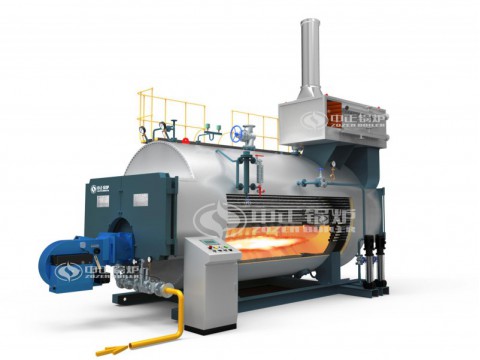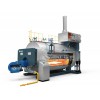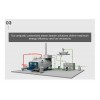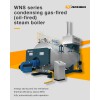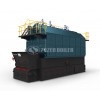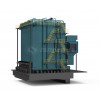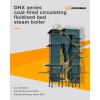Introduction :
WNS series horizontal internal combustion boiler is a boiler shell type 3 passes wetback oil/gas fired boiler. After fuel is being atomized by burner, flame is full of the wave furnace and transfer heat via furnace wall, this is 1st pass; the high temperature smoke is collected in reversal chamber and then enters 2nd pass which is grooved tubes bundle area; after heat convection, air temperature gradually falls and goes to front smoke box and turn to 3rd pass, which is smooth tubes bundle area, and then enters chimney passing back smoke box and exhausted to the atmosphere.
Technical advantages :
Digitized manufacture
The key part such as material cutting, rolling, drilling are proceeded by advanced CNC machining process to reduce the assemble stress and extend boiler working lifetime.
The front and back smoke chamber plates are cut by CNC plasma cutting machine and looks tidy and beautiful.
Easy operation and maintenance :
* Fully automatically operating, with automatically adjustment and protection of burning, water level, temperature and steam pressure.
Longer working life :
* Smoke tube and tube sheet connection is expanded first to eliminate the gap between them, then adopt automatic argon arc welding to relief the stress and expand boilers working life.
* Longitudinal and girth joint adopt advanced automatic submerged-arc welding for good welding quality. All longitudinal and girth joint will have 100% radiographic inspection.
* Fin tube us ND steel or stainless-steel material which avoid low temperature corrosion.
* Inspection procedure point is set up to guarantee the sequence of expanding and welding, avoid cracking of the tube sheet holes.
Less fuel consumption :
* High quality aluminum silicate fiber is used with fire clay insulation, to control the boiler body temperature below 45â to control heat lost.
* Sufficient steam storage room and heating area makes boiler to generate high quality steam and high thermal power.
* Condenser is added to reuse the waste heat of the exhausted smoke to increase feeding waterâs temperature and reduce emission temperature, which can increase the thermal efficiency above 98% and save operating cost.

